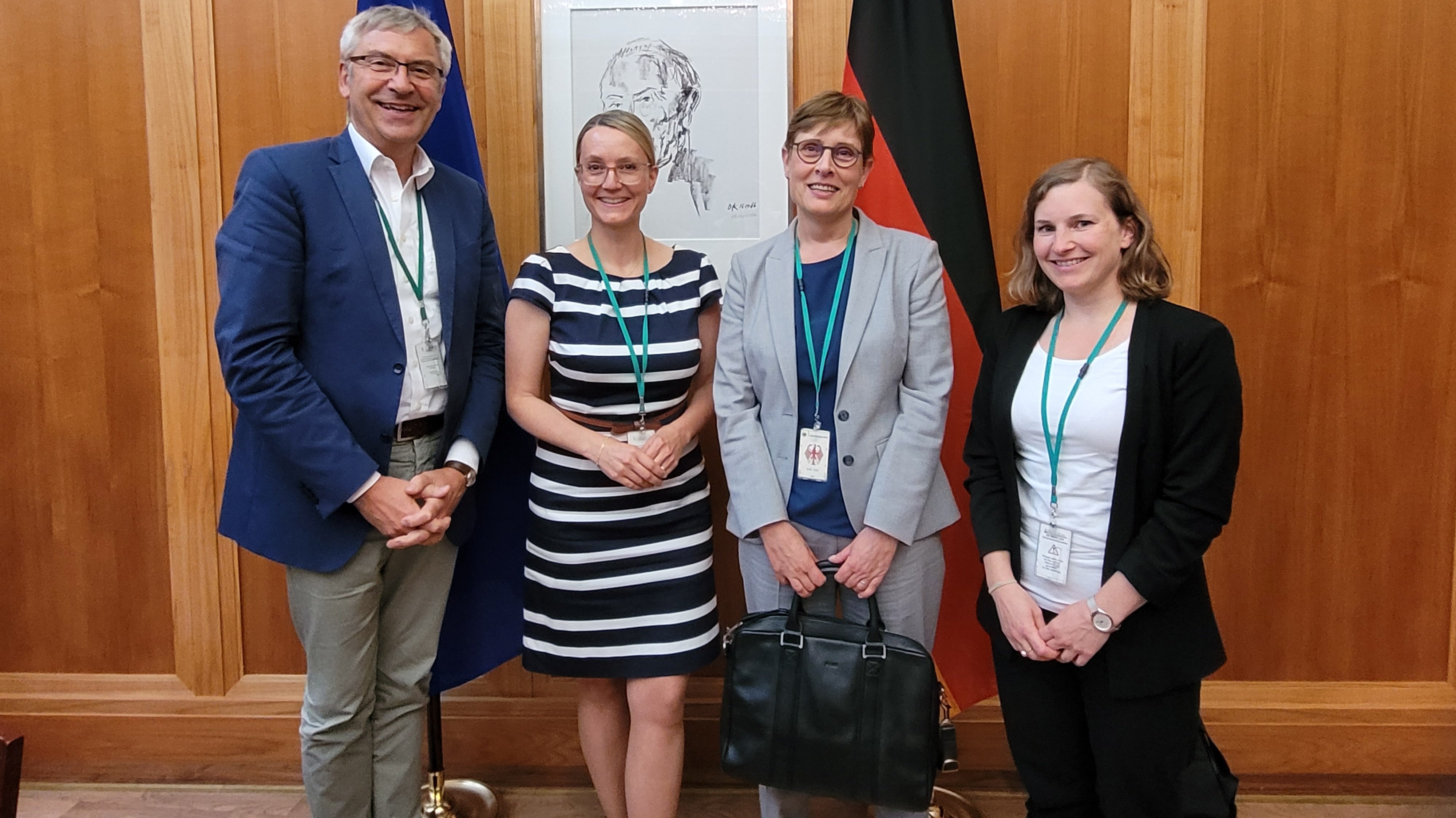Auf Einladung der Staatsministerin im Auswärtigen Amt, Katja Keul, kamen mehrere Vertreterinnen und Vertreter wissenschaftlicher Sammlungen in Berlin zu einem Gespräch zusammen. Es ging um das hochsensible Thema der menschlichen Überreste aus Afrika in deutschen Sammlungen, den „ancestral remains“ (Vorfahrinnen und Vorfahren) der Herkunftsgesellschaften, und um den angemessenen Umgang bis zur möglichen Rückgabe.
Das Museum der Universität Tübingen MUT befasst sich in einem vom Deutschen Zentrum Kulturgutverluste DZK und dem Ministerium für Wissenschaft, Forschung und Kunst Baden-Württemberg MWK geförderten Projekt seit 2021 mit der historischen Rekonstruktion der Herkunftswege menschlicher Überreste aus Afrika, die vor 1919 in die wissenschaftlichen Sammlungen Baden-Württembergs gelangt sind. Das Verbundprojekt „Prekäre Provenienz“ ist auf drei Jahre angelegt und läuft noch bis Ende August 2024. Mithilfe der historischen Netzwerkforschung soll die mögliche Herkunft der „ancestral remains“ bestimmt werden. Dabei ist auch die heutige Vernetzung essenziell, um den vor über 100 Jahren in die Sammlungen verbrachten Individuen den Weg zurück in ihre Heimat zu ermöglichen.
The MUT staff visit the Federal Foreign Office in Berlin
Conversation on dealing with a highly sensitive topic
Invited by the Minister of State at the Federal Foreign Office, Katja Keul, several representatives of scientific collections met in Berlin for a discussion. The topic was the highly sensitive issue of human remains from Africa in German collections, the “ancestral remains” of the societies of origin, and how to deal with them appropriately until they will be restituted.
In a project funded by the German Lost Art Foundation and the Baden-Württemberg Ministry of Science, Research and the Arts, the Museum of the University of Tübingen MUT has been working since 2021 on the historical reconstruction of how human remains from Africa ended up in Baden-Württemberg's scientific collections before 1919. The joint project “Precarious Provenance” is scheduled for three years and will run until the end of August 2024. With the help of historical network research, the possible origin of the “ancestral remains” is to be determined. Today’s networking is essential to provide all necessary information in order for the individuals who were brought into the collections over 100 years ago to be taken home.
Le MUT en visite au ministère des Affaires étrangères à Berlin
Entretien sur un sujet hautement sensible
A l’invitation de la ministre adjointe au ministère des Affaires étrangères de la République fédérale d’Allemagne, Katja Keul, plusieurs représentants et représentantes de collections scientifiques se sont réunis à Berlin. Ils ont abordé le sujet hautement sensible des restes humains – plus précisément des ancêtres des communautés concernées – provenant d’Afrique et qui se trouvent dans les collections allemandes. Le but étant de déterminer les conditions de conservation appropriées jusqu’au moment du rapatriement.
Dans le cadre d'un projet soutenu par le Centre allemand des biens culturels spoliés (Deutsches Zentrum Kulturgutverluste) et le Ministère des Sciences, de la Recherche et de l’Art du Bade-Wurtemberg, le musée de l’université de Tübingen MUT poursuit depuis 2021 des recherches sur la manière dont les restes humains provenant d’Afrique sont arrivés dans les collections scientifiques du Bade-Wurtemberg avant 1919. Le projet collectif « Provenance précaire » s’étend sur une durée de trois ans jusqu’à fin août 2024. La recherche historique sur les anciens réseaux vise à déterminer l’origine des restes humains. La mise en réseau actuelle est également essentielle pour que les individus entrés dans les collections il y a plus de 100 ans puissent retrouver le chemin de leur pays d’origine.



